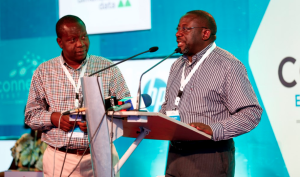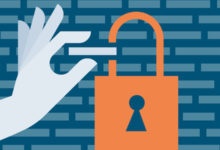
Dr.Fred Matiangi welcomes Uganda Minster for ICT to the East Africa Minsters Panel at Connected East Africa.
The Connected East Africa Summit has today commenced deliberations on how to seal the gaps in ICT integration and shared infrastructure among East African Member states.
Speaking during the inaugural East Africa Connected Summit; ICT Ministers from Uganda, Rwanda, Kenya and South Sudan hailed the event for providing a platform for networking and learning among member countries.
The 3-day event at Diani, Kwale County, brings together top ICT executives in the private and public sector to deliberate on how to grow the industry. This year’s theme is “The strength is in our networks,” and is looking at addressing ICT integration across the region.
“In Kenya ICT is one of the most vibrant sectors with its contribution to the GDP growing year after year. The sector has the ability to transform lives of those that we serve—our citizens. If we all work together in the region we will be able to achieve our goals of improving the lives of our people,” said Dr. Fred Matiang’i – Cabinet Secretary Ministry of Information Communications and Technology.
Among the main focus areas of the 2015 summit are the Critical Infrastructure Act, 2015, local content policy, Enterprise Kenya; and the increase in allocation of funds to ICT projects from less than 3 per cent to a minimum of 5 per cent. Enterprise Kenya is looking at funding 50 start-ups to achieve global standards by the year 2015.
Dr Matiang’i reported that a taskforce is working on a new regulation that will offer mitigation measures against vandalism and provide guidelines to better management of infrastructure right from the conception and design stages. The bill will be the first in Africa and is expected to be tabled in parliament in the next 3 months. Among the key players in its’ development include; Ministry of Transport and Infrastructure, Ministry of Energy and Petroleum, Ministry of ICT, the Kenya Private Sector Alliance (KEPSA), Engineers Board of Kenya, Telecommunication Service Providers Association of Kenya (TESPOK) and Safaricom.
“Kenya and East Africa loses substantial resources each year through the destruction of key infrastructure. The resources used to carry out these repairs can be used for the provision of other essential services. It’s is critical that partners coordinate to protect these facilities that are critical to a better economy and wellbeing,” added Dr. Matiang’i.
An important focus of this year event, is on how to grow local ICT SME’s as a way of impacting on job creation and growing the region income.
“We recently created Enterprise Kenya which will drive engagements with relevant government agencies and push for local content and businesses. Through the entity we plan to catalyze startup businesses to the global arena,” said Victor Kyalo, CEO, ICT Authority.
Aligning to this push, Microsoft launched an online hub that will connect SMEs’ across Africa by aggregating premium offers and relevant online services. The portal will be available at Biz4Afrika.
“Biz4Afrika is an Africa-wide network of SMEs designed to enable a sustainable and connected community of entrepreneurs which will impact on job creation, global competitiveness and wealth creation. The online hub aims to meet the needs of every start-up or SME whether in start, growth and acceleration phases,” said Kunle Awosika, Microsoft Kenya Country Manager.
According to Microsoft, the project was informed by a research that showed that tech-savvy SMEs create twice as many new jobs and grow revenues 15% faster than SMEs using little technology. Microsoft is this year’s summit title sponsor.
Major areas of collaboration among East Africa member states so far have included; One Area Network, Digital Migration, Broadband Strategies, Nothern Corridor, Integrated terrestrial communication network across the region (fiber network) and the Integration of National Backbones for harmonized ‘smart plans’. Others are East Africa Broadband ICT Infrastructure Network (EAC-BIN), as well as EAC
Medicine Registration Harmornisation project. On policies, member states are working on EAC legal framework for Cyber laws and ICT policy & Harmonisation framework.
Other sponsors of the summit include IBM, HP, Huawei, Konza, Ushahidi, Liquid Telecom, SEACOM, Dimension Data, Communication Authority, MTN Business, Oracle and Safaricom.





